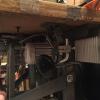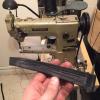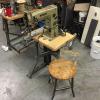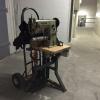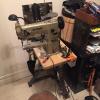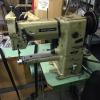-
Posts
8 -
Joined
-
Last visited
zacb's Achievements

New Member (1/4)
-

Fitting A Nakajima 380 In A New York Apartment
zacb replied to zacb's topic in Leather Sewing Machines
Uwe, that's some nice-looking cobbling! Your custom work was actually one of the reasons I ended up frequenting these forums, and I'm taking notes on your removable cylinder-bed worktables for one of my own down the road. And that answers another question I had, whether there was any reason you couldn't put a servo behind the machine on top of the table. Do you find it's ever in the way?- 12 replies
-
- nakajima 380
- industrial table
-
(and 1 more)
Tagged with:
-

Fitting A Nakajima 380 In A New York Apartment
zacb replied to zacb's topic in Leather Sewing Machines
That base would be a decent starting point, but it'd need a bunch of fiddling to get it to work, and there's still the stability issue. My day job is fabrication, so I've got everything but the time. The eventual plan is something like the Cowboy table, only with knee lift (if I still like it) and a movable electronic pedal based off the consew servo controller. Any ideas on whether the outboard table on the right side is actually useful? I find that horizontal surfaces tend to just gather cruft, and would rather have an accessories drawer or some storage on the post and keep the overall footprint smaller.- 12 replies
-
- nakajima 380
- industrial table
-
(and 1 more)
Tagged with:
-

Fitting A Nakajima 380 In A New York Apartment
zacb replied to zacb's topic in Leather Sewing Machines
Good suggestions! The plywood makes sense (and will be the next step if it turns out to be too unstable), though I think I'm still going to go with a free-floating pedal - being able to move it and sweep under the machine outweighs the time to get it repositioned afterwards. If I didn't live in terror of my tiny Sicilian landlady, I'd just lag the back corner to the floor and call it a day. For now, that 50+ pound counterweight does a pretty good job of keeping things stable. I debated the bartacker-style setup, but it looked like if I was to leave enough legroom for a comfortable sewing position, I'd have to move the head way out past the legs, negating the gain in stability. I'm eventually going to go ahead and make a single-post table with a nice wide base, but as I said, it'll be some time before I get around to doing it, and this iteration (which I freely admit is a bodge of the most questionable kind) gives me a chance to use the machine for a while and see what the ergonomics should actually be. I'll keep this thread updated as that next version moves from thoughts to sketches to steel & phenolic. Thanks for the thoughts!- 12 replies
-
- nakajima 380
- industrial table
-
(and 1 more)
Tagged with:
-
I think the stitch length dial was the key to quickly telling them apart. A little googling later, I now have the 341 manual, which is a great start. Thanks again!
- 7 replies
-
- nakajima
- cylinder bed
-
(and 3 more)
Tagged with:
-
Industrial machines are awesome. Apartments are tiny. I just got a great deal on a Nakajima 380 from a shop that was closing up, and wanted to bring it home. With a 42" wide table, that simply wasn't going to happen. So, with a little tinkering, I put together a very rough-and-ready tiny cylinder-bed table. It's not the prettiest by a looooong shot, but it works, and it's about two feet square. I thought I'd put up some photos in case anyone else wanted to try doing the same; also happy to answer any questions folks have! So, the machine came to me like this: 3-phase clutch motor, decently solid K-leg table, mint-green top, and way way too big for the space I had. So the Nakajima actually came as part of a package with a couple other machines (the old New York story, everything had to be out by the first of the year), and I'd trimmed a chunk off another industrial table to make it fit into my shop. I was going to use that smaller square chunk and fabricate a post base for it - a nice welded 4x4 with some angle iron bracing, yadda yadda. I have the equipment & materials for it, but it'd be spring before I had the time to actually put it all together. And then inspiration struck. K-legs are kinda like tinker toys, right? So just bolt them together! Some cutting and drilling later, I had three brackets: My apartment (sadly) doesn't have 3-phase power, so off with the clutch motor (if anyone wants it, let me know!) and on with a new Consew servo from my local Sewing Machine Guy (everybody should have one). A little on the pricey side, but soo nice, and I haven't even hooked up the EPS yet. That, plus the bolted-together K-legs (and a diagonal brace bodged together from the back strut of the table), gave me this: Going for space-saving over ergonomics (this is a hobby, not my day job), I wanted to convert the presser foot from pedal to knee lift. Another visit to Sewing Machine Guy came up with a knee lift bracket, and a bit of strategically bent steel rod did the rest. It ain't pretty under there, but everything works and everything clears (barely) - and most importantly, almost everything is off the floor. And now it was actually movable! So I took her home! Pro tip: Don't do this unless you are very very familiar with your local sidewalks and have a short trip. Many new and creative profanities later, she arrived safe and ready to go. Well, good enough - sharp-eyed folks will see that the "pedal" is just the servo controller C-clamped to the side rail of the K-leg. For now, it works. Eventually I'll figure out how to tack that controlled on the side of a real pedal, but that means longer wires and some bracketry, and I wanted it Done and Usable rather than staying a project forever: And lastly, yes, she sews! Even with a terribly dull needle, it went through 3/16" of leather like butter: Now for the downside: Very sharp eyes will see that there's a strange object tucked up where the two legs meet, two photos up… it's a counterweight. The reason this table won't be a permanent solution is that it's just a liiiitle bit unstable. If I put more than 30# of pressure on the cylinder arm, the machine wants to make friends with my lap. So, it's a bodge. It took about 4 hours and basically $0, let me put an industrial machine in my apartment, and lets me see what the ergonomics of a post stand are actually like so I can build a better one when I have the time. Maybe it'll provide some inspiration to other folks out there trying to do something similar. Best, -Zac
- 12 replies
-
- nakajima 380
- industrial table
-
(and 1 more)
Tagged with:
-
Thanks - that's exactly what I was looking for, I was apparently just selectively blind. Much appreciated!
- 7 replies
-
- nakajima
- cylinder bed
-
(and 3 more)
Tagged with:
-
So I just picked up a nice used Nakajima 380 cylinder-bed machine and was wondering if anyone out there might have a lead on a manual for it? I know it's a long shot, but hey. Alternately, does anyone know which Juki model it would correspond most closely to, and if there might be a manual available for that? I understand they bought out Nakajima at one point, but I can't seem to find a comprehensive listing of Juki model numbers and have given up on searching images and plugging in model numbers at random. Here's the machine when I first looked at it: I redid the table and installed a servo so I could bring it home; I'll put that up in another thread shortly and link to it from here if anyone's interested.
- 7 replies
-
- nakajima
- cylinder bed
-
(and 3 more)
Tagged with:
-
Hi all, Not sure about the rules here but wanted to say hi - have been lurking for a month or so and figured I should actually sign up as a member! My day job is machining and fabrication in South Brooklyn; sewing is very much a side project, but I've always been interested in leather and webbing work, so when a shop around the corner from me closed up and posted "walking foot machines for sale", I went for it. I'll post pictures of the machines and some modifications I did to get a cylinder-bed industrial into a New York apartment in another thread, and I have a couple extra box and bar tack heads that I'll post in the "For Sale" section shortly. All the info here helped greatly in figuring out what to look for in a machine and what to do with one once I got it - I look forward to learning more and maybe showing you all some cool stuff down the road! -Zac
- 1 reply
-
- introduction
- sewing machines
-
(and 1 more)
Tagged with:





